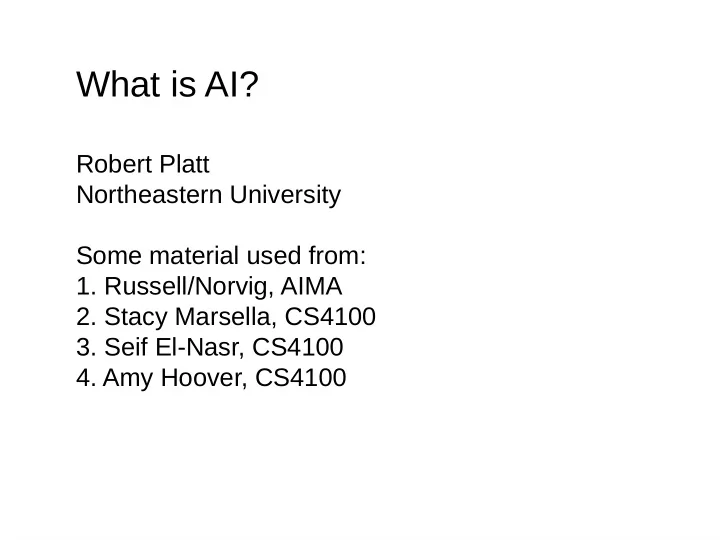

What is AI? Robert Platt Northeastern University Some material used from: 1. Russell/Norvig, AIMA 2. Stacy Marsella, CS4100 3. Seif El-Nasr, CS4100 4. Amy Hoover, CS4100
What is AI? ■ Historical perspective: – Handbook of AI: the part of computer science concerned with designing intelligent computer systems, that is, systems that exhibit the characteristics we associate with intelligence in human behavior ■ Thoughts on this defjnition?
What is AI? ■ Historical perspective: – Handbook of AI: the part of computer science concerned with designing intelligent computer systems, that is, systems that exhibit the characteristics we associate with intelligence in human behavior ■ Which is harder? Why? Decide on moves Recognize pieces and move them VS
What is AI? ■ Historical perspective: – Handbook of AI: the part of computer science concerned with designing intelligent computer systems, that is, systems that exhibit the characteristics we associate with intelligence in human behavior ■ What we think requires intelligence is often wrong – Elephants don’t play chess, Rodney Brooks – People perform behaviors that on the surface seem simple since they require little conscious thought. – Eg. Recognizing a friend in a crowd.
What is AI? ■ Historical perspective: – Handbook of AI: the part of computer science concerned with designing intelligent computer systems, that is, systems that exhibit the characteristics we associate with intelligence in human behavior ■ It’s a moving T arget: once we come up with an algorithm or technology to perform a task, we tend to re-assess our beliefs that it requires intelligence or is AI – Beating the best human chess player was a dream of AI from its birth – Deep blue eventually beats the best – “Deep Blue is unintelligent because it is so narrow. It can win a chess game, but it can't recognize, much less pick up, a chess piece. It can't even carry on a conversation about the game it just won. Since the essence of intelligence would seem to be breadth, or the ability to react creatively to a wide variety of situations, it's hard to credit Deep Blue with much intelligence.” Drew McDermott
What is AI? ■ Historical perspective: – Handbook of AI: the part of computer science concerned with designing intelligent computer systems, that is, systems that exhibit the characteristics we associate with intelligence in human behavior ■ Wrong approach: The algorithm or technology may not seem intelligent – Deep Blue relied on high speed brute force search – Raised the question: Is that how people do it? – Why not?
What is AI? ■ Historical perspective: – Handbook of AI: the part of computer science concerned with designing intelligent computer systems, that is, systems that exhibit the characteristics we associate with intelligence in human behavior ■ Wrong approach: The algorithm or technology may not seem intelligent Moral: What tasks we think are the hallmark of intelligence Moral: What tasks we think are the hallmark of intelligence – Deep Blue relied on high speed brute force search has been in fmux since the dawn of the industrial age. has been in fmux since the dawn of the industrial age. – Raised the question: Is that how people do it? – Why not?
What is AI? Russell & Norvig: Views of AI fall into four categories: Thinking Humanly Thinking Rationally Acting Human Acting Rationally The textbook organized around "acting rationally” but lets consider the others as well…
Measuring Intelligence: Turing Test Measures whether a computer acts like a human
Turing Test What is needed to pass Turing Test? ■ Natural language processing: to communicate with examiner. ■ Knowledge representation: to store and retrieve information provided before or during interrogation. ■ Automated reasoning: to use the stored information to answer questions and to draw new conclusions. ■ Machine learning: to adapt to new circumstances and to detect and extrapolate patterns.
ELIZA (1966) Shallow emulation of a Rogerian Psychotherapist: (Rogerians help client express their feelings without judgement) Person : Men are all alike. ELIZA : In what way? Person : They're always bugging us about something or other. ELIZA : Can you think of a specifjc example? Person : Well, my boyfriend made me come here. ELIZA : Your boyfriend made you come here? Person : He says I'm depressed much of the time. ELIZA : I am sorry to hear that you are depressed. Person : It's true. I am unhappy. ELIZA : Do you think coming here will help you not to be unhappy? Person : I need some help, that much seems certain. ELIZA : What would it mean to you if you got some help? Person : Perhaps I could learn to get along with my mother. ELIZA : T ell me more about your family
ELIZA and the Turing Test People conversing with Eliza sometimes thought they were talking to a human. – So did Eliza pass the Turing Test? – Not tested in the format that Turing proposed. – Still, people quick to attribute attributes to the machine Maybe in a real T uring T est a relatively simple computer program can ‘trick’ the interrogator as well? – Loebner Prize
Beyond Chatbots http://www.youtube.com/watch?v=oG-2qr78GbE&playnext=1&list=PLSVPS6u0z0xfa7 Xml9TKLv6IWcHF5cNBc&feature=results_main
Total Turing Test The original Turing Test (the TT) measures human/computer similarity in terms of verbal responses. – criticized for being too limited. So, measure similarity of other capabilities as well: – how similar is computer vision to human vision? – how similar is computer manipulation to human manipulation? – etc.
Searle's Chinese Room Suppose we are given a program that passes a Chinese version of the Turing Test Suppose a human executes the program instead of a computer Does the human really understand Chinese or is he just simulating that ability? – strong AI vs weak AI
Recommend
More recommend